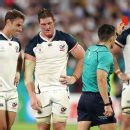TOKYO — The United States came to the Rugby World Cup hoping to continue its improvement of the past 18 months under coach Gary Gold, but the Americans’ first game instead served as a reminder of how much more work is still to be done — particularly across rugby’s core team fundamentals.
The Eagles’ 45-7 defeat to England on a sweaty evening under the roof at Kobe Misaki Stadium on Thursday night was in no way an unexpected result, particularly given Eddie Jones’ team is one of the top nations in Japan, with a squad that has been building to this very tournament for four years.
And while they were by no means embarrassed, the Eagles were incredibly limited in attack and then kicked away what decent possession they did have inside England’s half. There was also the late sending off of flanker John Quill, who clearly hadn’t been following the Reece Hodge news this week, after he whacked Owen Farrell with a nasty shoulder charge that probably will end the American’s tournament.
Gold had told ESPN before the tournament that his team would take a “pragmatic” approach to its attack, and while that might be smart for where the Eagles are right now, it will need to be just a little bit more expansive if they are to be more competitive against other Tier 1 teams Argentina and France, and then push for victory against Tonga at this tournament.
To their credit, the Eagles never gave up. And when, after 80 minutes, it at last showed a willingness to move the ball, the U.S. was rewarded with a post-siren try to Bryce Campbell that brought a roar from the Kobe Misaki Stadium crowd.
“I’m proud of the guys that they didn’t roll over … it’s just a fantastic group of guys that really want to work very hard, but we were taught some lessons today,” Gold said. “We lost every single aspect of the game; we lost the collisions; we lost the set piece; we lost defensively, and most importantly we lost the kicking game.”
The U.S. simply had no answer to England’s rolling maul — the lineout drive that is incredibly difficult to stop from close range — nor fly-half George Ford’s kicking game, and also was under huge scrum pressure throughout. England scored two tries from the rolling maul, after Ford had opened the scoring by running between to U.S. defenders on five minutes, and it remained a powerful weapon throughout.
The Eagles’ scrum certainly wasn’t at all helped by the early loss of prop David Ainuu to injury after only four minutes, as referee Nic Berry was repeatedly left with little option but to reward dominance that saw the England forwards march over the top of their opponents on multiple occasions.
The U.S. did well to scramble in defence to prevent two other English first-half tries. But given they had enjoyed just a 34% share of possession and had already been required to make 28 more tackles than their opponents to halftime, it was almost inevitable that further cracks would appear in the Eagles’ defence upon the resumption.
England had led 19-0 at halftime and extended that margin by another five with a try to Joe Cokanasiga seven minutes into the second half, as it became clear the scrambling run that was in the Americans’ legs was fast running dry.
And so it proved as England added further tries through Ruaridh McConnochie, Lewis Ludlam and Cokanasiga again, to run out comfortable winners, in a performance that satisfied Jones.
This was always going to be a huge challenge for the Eagles, though, and their areas of improvement will be easily identified in the video review session. Thursday night’s game will also be a timely reminder of just where they sit in the world of rugby, no matter the progress of the past 18 months, and the mountain that is left to climb before they truly arrive at rugby’s top table.
“I don’t think we were credible tonight, not by our standards,” Gold said. “We are a better rugby team than that; we’re not better than England, but we’re a better rugby team than that.”
Maul defence, a more assured set piece at both the lineout and scrum, and a willingness to be just a tad more adventurous in attack, for a start, should top the list of work-ons before the Americans meet France in Fukuoka on Wednesday.
Fifty-four missed tackles of the 100 more they had to make than England is also a serious concern, and highlights the need to be prepared to play a little bit more with the ball just as they did in the game’s final minute.
A steady improvement across all those areas and a lower losing margin against another Tier 1 squad is entirely possible, so too a concluding victory against fellow Tier 2 nation Tonga.
“There are a lot of lessons to be learned out of that and full credit goes to England for putting us under the amount of pressure that we were under and exploiting ruthlessly some of the areas that we do need work in,” Eagles captain Blaine Scully said when asked how his team would bounce back.
“Although we’re slightly disappointed in the performance, our reaction is what’s going to define us. So it’s our ability to look back and learn what we can from this, show up for work tomorrow and try to get better and put in an improved performance next week.”
Credit: Source link
